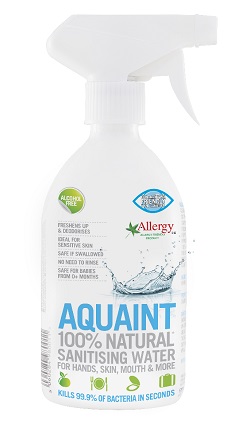Do We Need to Do More to Ensure Our Hands are Clean?
A new study, commissioned by water-based sanitiser brand, Aquaint, suggests that our hands are dirtier than many public surfaces, harbour a staggering 30,203% more bacteria, which means that hands are far more likely to make us unwell than grubby surfaces.
But should we simply stop shaking hands, avoid touching surfaces, or take advantage of the many products available to sanitise on the go?
After observing the entrance to a Surrey hospital, on the eve of Global Handwashing Day we noted less than 1 in 10 people used the hand cleaning gel dispensers.
Global Handwashing Day promotes the use of soap for washing your hands but when you are out can you still protect yourself between 'washes'? There is a fine line between being clean and becoming obsessed but as this study shows, we seem to be worse at hand washing than we thought.
The Aquaint study showed that the average person carries over 10 million bacteria on the hands, in comparison to just 33,000 found on public surfaces and a study of attitudes towards hand washing revealed that only 13% would avoid eating unless they had washed or cleansed their hands.
In the research, twenty-five swabs were taken from multiple high street and shopping centre locations in St Albans and Luton, collected from surfaces including tables, public benches, escalator handrails, high chairs and children's ride-on toys. In all cases, the surfaces were given a 'poor' visual rating, which indicates stains, debris and signs of wear.
The samples were then laboratory tested for a range of harmful bacteria including staphylococcus, E.coli and enterobacteriaceae, which have all been linked to illnesses and deaths.
The overall quantity of bacteria measured in public spaces was actually relatively low - 33,000 in the worst example, from a wooden public bench - whereas the average person carries over 10 million bacteria on the hands alone. There was also no notable difference between the results retrieved from the swabs from St Albans city and Luton town centre.
Alongside this study, Aquaint polled members of the public on habits and attitudes to germs. Unsurprisingly, 92% of those polled said they would avoid dirty looking tables and seats, citing health as the primary concern. This indifference towards hand washing tallies with research by Queen Mary, University of London (QMUL) and the London School of Hygiene and Tropical Medicine (LSHTM) in 2012, which found that faecal matter is present on 26% of hands in the UK. Faecal matter is rife with germs - around one billion per gram.
"This study highlights the fact that people avoid what they believe will make them unwell when in fact public surfaces contain less harmful bacteria than we think. Our hands operate a highly effective public transport network for bacteria and viruses and germs can be easily transmitted. During the course of a day, we all touch hundreds of surfaces and mixed attitudes to hand washing may be at the root of the problem. Other people's hand hygiene is totally out of our control so rather than just avoiding certain areas or surfaces, good hand hygiene for everyone should be the top priority. Our hands are in frequent contact with our mouths or with items that we put into our mouths, making them the fastest route to illness.
Visual cues about germs and bacteria can be very misleading. In areas of high footfall, especially in the sorts of places we tested, surfaces are touched and wiped by thousands of hands, bags and cloths every day. Although these surfaces looked unpleasant, we found very little evidence of harmful bacteria because germs are picked up and deposited all of the time. A dirty table is not pleasant but neither is it dangerous by default. By contrast, a gleaming shiny table could well be harbouring high levels of potentially dangerous bacteria. The lesson is that unless you've cleaned your hands as well as the surface, it's a lottery.
Here at Aquaint, we strongly recommend that Brits look at their own hand hygiene habits and cleanse their hands regularly during the day; before and after eating, after using the toilet and when coming into contact with other hands, e.g. shaking hands."
Bola Lafe, founder of Aquaint water-based sanitiser
The study was commissioned by Aquaint in order to understand how instinctive reactions to environmental conditions might inadvertently lead to an impact on health.
Aquaint's water-based sanitiser spray contains Hypochlorous Acid, a harmless, natural acid also produced in the human body to kill bacteria, which kills 99.9% of bacteria and yet vanishes almost instantaneously. The spray contains no other ingredients and is so safe that it has passed stringent UK drinking water requirements. The product is aimed at families and individuals on the move who want the reassurance of good hand hygiene as and when needed, and especially when soap and water are not at hand.
"Allergy UK are delighted to recognise Aquaint as one of our Allergy Friendly Products. Aquaint is a unique sanitiser that does not use alcohol or other harmful chemicals, and is, therefore, unlikely to cause a reaction in those with allergies and sensitive skin. Aquaint can be safely used on the hands and body, and even on the skin of a new born baby, as well as on surfaces (even those that touch a baby's mouth) with no need to rinse off."
Lindsey McManus, Deputy CEO, Allergy UK
For more information on Aquaint water-based sanitiser visit https://www.aquaint-uk.com